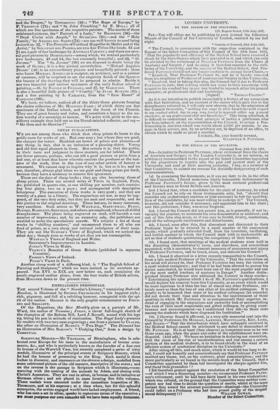TO THE EDITOR OF THE SPECTATOR.
Cleveland Row, 24th July 1831.
Stu—In justice to Professor PATTISON, whose retirement from the chairs of Anatomy and Surgery in the London University is, in my opinion, so arbitrarily recommended in the report of the Select Committee appointed by the proprietors to inquire into the past and present state of the University, and read at their meetines yesterday, I beg, as a member of that Committee, to submit my reasons for decidedly disapproving of such recommendation.
1st. In examining the documents, as it was my duty to do, in the office of the University, I found numerous highly honourable testimonials' in Professor PATTISON'S favour, given by the most eminent professional and literary men in Great Britain and America.
2nd. I found that, when a candidate for the chair of Anatomy, be asked the Council not to rely on these testimonials only, but, " should they consider any probationary exercise or trial necessary to test the qualifica- tion of the candidates, he was most willing to undergo it." The Council, however, did not consider it necessary, and appointed him to the chair ; and this preference, I fear, was never forgiven.
3rd. I found the Council did not permit him, as is generally, if not in- variably the practice, to nominate his own demonstrator or assistant ; and out of this false step arose, as it was easy to foretel, rivalry, contention, and all the subsequent excitements and disturbances.
4th. I found, soon after this, that discontent and disrespect to their Professor began to be evinced by a small number of the anatomical pupils; which gradually extended itself, from the irresolute, vacillating, and foolish manner in which the Council dealt with so inadmissible an act as that of students questioning the competency of their teacher.
5th. I found next, that meetings of the medical students were held in the dissecting (demonstrator's) room, and elsewhere, and committees appointed, with a secretary, to concert measures of annoyance and injury to Professor PATTISON, and to beard, abuse, and ridicule the Council I 6th. I found it observed in a letter recently transmitted to the Council, from a late medical Professor of the University, " That the conviction on his mind will always be, that Professor PATTISON has been the victim of a most wicked conspiracy; and that if he had been allowed to pursue his duties unmolested, he would have been one of the most popular and one of the most useful teachers of anatomy in Europe." Another distin- guished literary Professor also addressed the Council in these words- " Entertaining the opinion which I do of Mr. PATTISON'S qualifications, I would deplore his removal from this University, as an event which would be more injurious to it than the loss of almost any other Professor, cer- tainly more so than the loss of any other of his medical colleagues. It is greatly to be lamented that some of his medical colleagues (he remarks) did not devote their time and attention to the improvement of those qualities in which Mr. PATTISON is so conspicuously their superior, in- stead of eneaging in the ungracious and unworthy task of accomplishing the ruin of their most respectable and gifted colleague, by giving coun- tenance and encouragement—as I understand they did—to those riots among the students which have disgraced the Institution."
7th. I likewise found it affirmed, in a very able memorial sent into the
Council by Professors DE MORGAN, LARDNER, MACCULLOCH, KEY, LONG, and ROSEN—" That the disturbances which have unhappily occurred in the Medical School cannot be attributed to any defect or misconduct of Mr. PATTISON. He is at least (they observe) as competent now as he was three years ago, when the peace and order of the establishment were un- disputed. (And add,) We have no hesitation in declaring our conviction, that the cause of the rise of insubordination and riot among a certain portion of the medical students, is to be found chiefly in the want of an efficient system of academical discipline in the University."
After seeing all this, and much more, which it would be too long to de-
tail, I could not honestly and conscientiously say that Professor PATTISON merited any blame, but, on the contrary, great commiseration; and the more particularly as we found in the minute-book of the Council, that a Committee appointed by them had investigated the charges against him, and found them groundless ! !
I did therefore protest against the resolution of the Select Committee
—of which I was a dissenting member—to recommend Professor PATTI.. SON'S retirement, until he had been fairly heard in his own vindication; which was refused, on the ground that the Committee were neither com- petent nor had time to decide the question of merits, whilst at the same instant they award the severest punishment—dismissal—the University could inflict on a Professor who had been proved guilty of the deepest Member of the Select Committee.


























 Previous page
Previous page